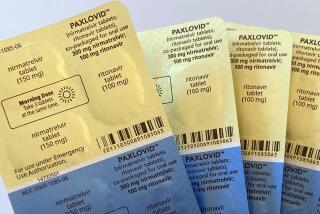Double whammy: Swapped-out drug, higher charge
Susan Segal normally spends about $30 for a three-month supply of a thyroid medication from CVS Caremark’s mail-order pharmacy.
Recently, though, CVS sent her a different thyroid drug, which cost $23 more — a 77% increase.
Segal, 56, called to complain. A CVS service rep told the Irvine resident that the pharmacy wasn’t trying to pull a fast one.
Have a consumer question? Ask Laz
The rep explained that Segal’s usual med, Levoxyl, couldn’t be obtained, so CVS called her doctor and received permission to send her a similar drug, Synthroid, instead.
It’s not unheard of for pharmacies to swap out one drug for another if there’s a shortage. The idea is to ensure that the patient doesn’t go cold turkey.
In Segal’s case, the manufacturer of Levoxyl, King Pharmaceuticals, a subsidiary of Pfizer, announced in March that it was recalling the drug because of “complaints from pharmacists and patients of an uncharacteristic odor.” It said Levoxyl might not be available again until next year.
Had Segal bought her meds at a drugstore, she would have learned about the Levoxyl shortage at the point of sale and could have declined a more expensive substitute.
But, like many people, she buys her meds online. CVS informed Segal of the switch by letter. Problem was, the letter was included with the new medication, not sent in advance of the mail-order shipment.
Segal asked whether she could return the Synthroid for a refund. No, the CVS rep replied. Once a drug is shipped, it can’t be returned.
Segal asked whether she at least could be charged the lower price she would have paid for Levoxyl. Again, no. All sales are final.
“I was furious,” Segal told me. “They had time to call my doctor about this before sending out the drug, but not me?”
So what would she have done had she known she couldn’t get her Levoxyl?
“I would have asked for my prescription back so I could try and find it at another pharmacy,” Segal replied. “Maybe someone else would have had it.”
Seems reasonable.
“And if that didn’t work,” Segal continued, “I would have asked my doctor if there was another drug, or a generic, I could have taken that would have been cheaper than Synthroid.”
Another reasonable move.
“But I was never given the chance,” Segal said. “And when I said this to CVS, they were unapologetic.”
She makes fair points. A drug shortage isn’t the fault of a drugstore. But the patient should have certain rights in this circumstance, and one such right should be the ability to make an informed decision about what drug to buy as an alternative.
“If I order a coffeepot from Amazon and they swap it out for a more expensive coffeepot, I shouldn’t have to pay the higher price,” said William E. Fassett, a professor at Washington State University’s College of Pharmacy.
“Patients should be told of any substitution before being made to pay for it,” he said. “You should only have to pay what you agree to pay.”
Jim Thornton, a health economist at Eastern Michigan University, said patients should be included in any decisions involving their treatment.
“I believe doctors should be required to consult patients before giving a pharmacy permission to make these sorts of drug substitutions,” he said. “Pharmacies should be required to inform patients about drug substitutions so they have the option to seek out alternatives.”
Christine Cramer, a CVS Caremark spokeswoman, declined to comment when I asked what rights patients should have in situations like Segal’s.
But she said that, in response to my bringing Segal’s dissatisfaction to the company’s attention, “we are providing a credit for the difference in the co-pay.” In other words, she’ll be charged what she would have paid for her intended drug order.
That’s nice, but it overlooks the fact that CVS did nothing when the customer herself brought up the matter. It was only after the prospect of bad publicity arose that the company was moved to act fairly.
Moreover, CVS’ response doesn’t address the potentially thousands of other customers who also may find themselves paying more for a substitute med they never requested or approved.
If Segal’s complaint merited action, doesn’t every other person in her position similarly deserve a credited refund? You’d think so.
Unwanted meds
Speaking of which, Adele Curcuruto, 55, told me that CVS refilled a prescription for her thyroid medicine recently even though she’d watched her doctor cancel the prescription online.
The Burbank resident called CVS to complain and was told that she had to cancel her automatic refill order separately. The company said she couldn’t return the unwanted pills.
This is, of course, silly. If CVS’ computers could receive word from Curcuruto’s doctor about the canceled prescription, those computers should have no difficulty canceling all related services. It seems absurd to require patients to jump through such hoops themselves.
CVS’ Cramer said that in response to my bringing this to the company’s attention, Curcuruto will be allowed to return the drug refill for a full refund.
Deja vu all over again.
David Lazarus’ column runs Tuesdays and Fridays. He also can be seen daily on KTLA-TV and followed on Twitter @Davidlaz. Send your tips or feedback to david.lazarus@latimes.com.







